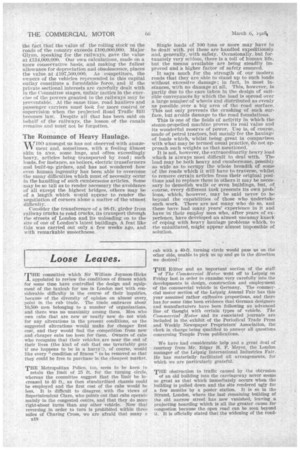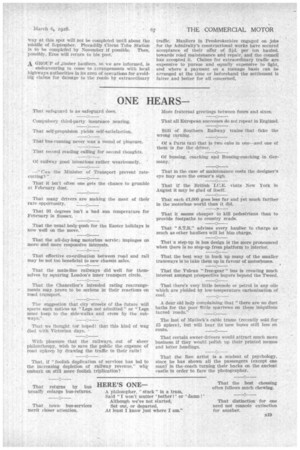Loose Leaves.
Page 44

Page 45

If you've noticed an error in this article please click here to report it so we can fix it.
rill HE committee which Sir William Joynson-Hicks 1_ appointed to review the conditions of fitness which for some time have controlled the design and equipment of the taxicab for use in London met 'with considerable difficulty in the course of their, inquiries, because of the diversity of opinion on almost every, point in the cab trade. The trade embraces about 10,500 men belonging, to a number of organizations, and there was no -unanimity among them. Men who own cabs that are new or nearly new donot wish 'for any alterations in the present conditions, as the suggested alterations would make for cheaper first cost, and they would find, the competition from new and Cheaper eabs too keen for them. Owners of cabs who recognize that their vehicles are near the end of their lives (the kind of cab that one invariably gets if one happens to be in a hurry !), of course, would like every "condition of fitness" to be removed so that -they could be free to purchase in the cheapest market.
TRH Metropolitan Police, too, seem to be keen to
retain the limit of 25 ft. for the turning circle, whereas the committee suggest that the limit be increased to 40 ft., as then standardized chassis could be employed and the first cost of the cabs would be less. It is difficult to disagree with the views of Superintendent Claro, who points out that cabs operate mainly in the congested centre, and that they do more right-about turns than any other vehicle. Now that reversing in .order to turn is prohibited within three miles of Charing Cross, we are afraid that many a n1.8 cab with a 40-ft. turning circle would pass us on the other side, unable to pick us up and go in the direction we desired!
THE Editor and an important section of the staff of The Commercial Al otor went off to Leipzig on Friday last in order to examine very carefully into the developments in design, construction and employment of the commercial vehicle in Germany. The •commercial motor section of the Leipzig Annual Fair has this year assumed rather exttnsive proportions, and there has for some time been evidence that German designers and manufacturers have been following an advanced line of thought with certain types of vehicle. The Commercial Motor and its associated journals are included in the exhibit of the Periodical Trade Press and Weekly Newspaper Proprietors' Association, the clerk in charge being qualified to answer all questions concerning Temple Press publications.
We have had considerable help and a great deal of courtesy from Mr. Edgar H. P. Meyer, the London manager of the Leipzig International Industries Fair. He has materially facilitated all arrangements, for which we are particularly grateful.
THE obstruction to traffic caused by the obtrusion
of an old building into the carriageway never seems. so great as that which immediately occurs when the building is pulled down and the site rendered ugly for a few months by a poster station. It is so in the Strand, London, where the last remaining building of the old narrow street has now vanished, leaving .a projecting hoarding which is all the greater cause for congestion because the open road can be seen beyond it. It is officially stated that-the widening of the road
way at this spot will not be completed until about. the 'middle of September. Piccadilly Circus Tube Station is to be completed byNovember if possible. . Then, possibly, Eros will return to his post: .
A GROUP of .timber hauliers, so we are informed, is endeavouring, to come to arrangements with local .highways authorities in its area of operations for avoiding 'claims for damage to the roads by extraordinary
traffic. Hauliers in Pernbrokeahire engaged on jobs for the Admiralty's constructional works have secured acceptance of their offer of 31-d. per ton hauled, towards rchtd maintenance and repair, and thecouncil has accepted it. Claims for extraordinary traffic are expensive to pursue and equally expensive to fight, and where a payment on a tonnage basis can be arranged at the time or beforehand the settlement is fairer and better for all concerned,




















































































































